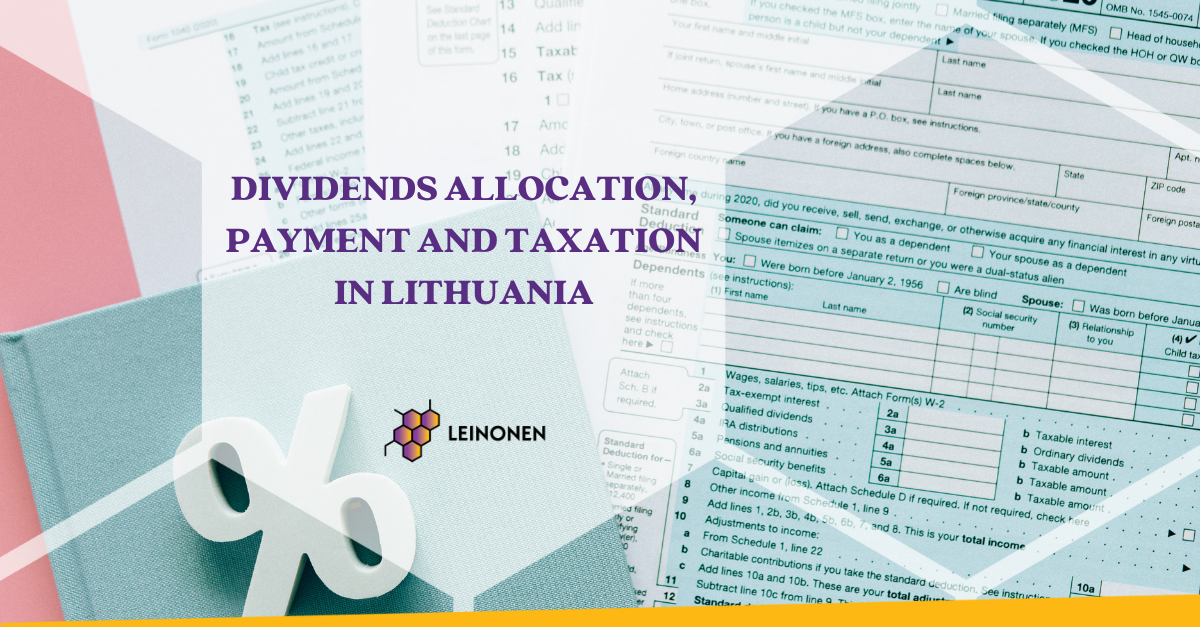Dividends are considered as a part of the profit allocated to the shareholder in proportion to the nominal value of the shares owned by such shareholder. Within four months from the end of the company’s financial year, the annual general meeting of shareholders, when approving the annual financial statements and distributing the profit, has the right to allocate a certain part of the profit for dividends (Point 11 of Part 2 of Article 59 of the Law on Companies of the Republic of Lithuania).
Allocation and payment of dividents
The annual general meeting of shareholders cannot make a decision to allocate and pay out dividends if at least one of the following conditions is met (Part 6 of Article 59 of the Law on Companies of the Republic of Lithuania):
- the company has outstanding obligations that are due before the decision is made;
- the amount of distributable profit (loss) of the reporting financial year is negative (loss received);
- the equity capital of the company is lower or upon payment of dividends would become lower than the aggregate amount of the authorized capital of the company, the legal reserve, the revaluation reserve and the reserve for acquisition of its own shares.
It is important to mention that dividends cannot be paid if the company fails to pay the taxes prescribed by laws within the established time limits.
The allocated dividends must be paid out within one month from the date of the decision to distribute the profit. The company pays dividends in money.
If the company does not pay dividends to the shareholders on time, it becomes their debtor, and the shareholders acquire the right to claim the allocated dividends during a legal dispute.
If the shareholders did not make a decision on the allocation of dividends within the four months from the end of the company’s financial year, when distributing the profit, it is possible to allocate dividends for a period shorter than the financial year. In this case, Law on Companies of the Republic of Lithuania establishes additional conditions for allocation of interim dividends.
Lithuanian dividend taxation principles
Taxation of dividends depends on who receives the dividends (natural or legal person, Lithuanian or foreign resident) as well as the amount and period of shares held.
If dividends are received by a natural person (permanent or non-permanent resident of Lithuania), a personal income tax rate of 15% is applied.
If dividends are received by a legal entity (Lithuanian or foreign company), they are taxed at a 15% corporate tax rate. However, the Law on Corporate Income Tax of the Republic of Lithuania establishes the “participation exception”, according to which dividends are not taxed if the following conditions are met:
- if the company owns (or intends to own) at least 10% of the voting shares in the company paying dividends for 12 months without interruption;
- the foreign company is not registered or otherwise organised in blacklisted territories, for example, in the Russian Federation.
In order to apply the aforementioned dividend exemption, it is recommended to have supporting documents, such as the shares acquisition documents, residence certificates.
It should be noted that if dividends are paid to a resident of foreign countries with which Lithuania has concluded a treaty for the avoidance of double taxation, then a lower income tax rate under the respective treaty may apply. When paying dividends to a resident of a foreign country (legal or natural person), the Lithuanian company may deduct tax according to the treaty for the avoidance of double taxation (a rate lower than 15%) only if the special form (DAS-1) is completed and approved by Tax Authorities before tax is paid.
Contact Leinonen’s Tax Consultants for all your taxation needs and questions.





